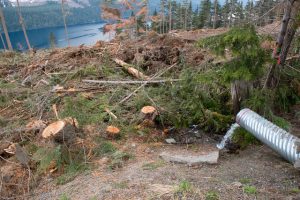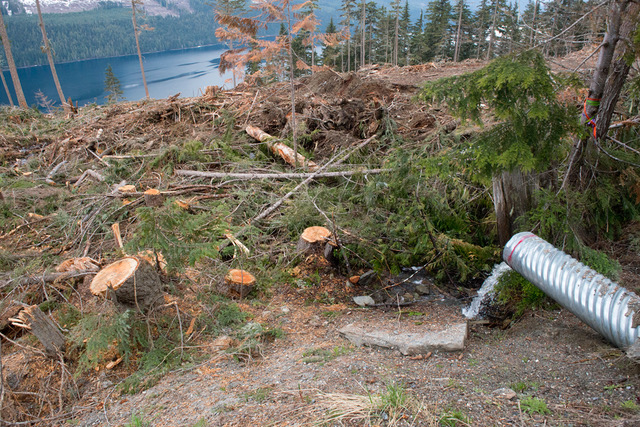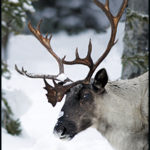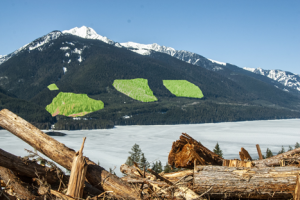Trout Lake Logging Risks Wiping Out Central Selkirk Mountain Caribou Herd
West Kootenays, Trout Lake —The Central Selkirk caribou herd lost another six animals last year; at 25 animals, it is in high danger of being wiped out. Yet BC Timber Sales (BCTS) is logging some of the herd’s last remaining old-growth forest along Trout Lake in the Lardeau River Valley. “I have been seeing caribou tracks on the edge of the clearcuts,” says Jim Lawrence, President of Friends of the Lardeau River and prominent wildlife photographer. “The two governments’ continued disregard for caribou survival is outrageous and makes a mockery of the Species at Risk Act.”
“This has been happening while the federal and provincial governments have spent a whole year talking about how they are going to protect more caribou habitat,” says Craig Pettitt, a Director of the Valhalla Wilderness Society (VWS). “Now the BC government says it wants another two years to complete new herd plans.”

New logging above Trout Lake; Lawrence and Pettitt viewed the tracks of endangered Mountain Caribou on the edge of the clearcut.
When the Minister of Environment and Climate Change Canada (ECCC) announced that the Mountain Caribou were under “immediate threat, the Central Selkirk herd was listed as being “of particular concern”.
“Is this what particular concern looks like?” asks Pettitt. “BC Timber Sales is trying to log off the unprotected habitat before it can be considered for additional protection.”
In 1996 the Central Selkirk herd had 235 animals. By 2000 it was down to 200. Then the Federal Species at Risk Act was declared and the Mountain Caribou Recovery Implementation Plan (MCRIP) began in 2003, but by the time MCRIP was finalized in 2008 the Central Selkirk herd had already dwindled to 88 animals. Each time the habitat was getting logged while the government talked, and in the end, very little habitat in the logging zones was protected. Now, 11 years later, the herd is at 25. These are the last remaining caribou south of the trans-Canada highway and will likely not sustain another two years of talk and log processes.
“When a caribou herd has lost so much habitat already, every new clearcut and every new road makes it less likely that the herd can be recovered to a self-sustaining level,” says Amber Peters, a VWS staff biologist. “Clearcutting decimates the caribou’s food source, so each new clearcut pushes them further and further into a
corner. Roads enable wolves to hunt more efficiently, and the smaller the core habitat becomes, the easier wolves can find the caribou.”
“BC Timber Sales has 11 more cutblocks planned or currently being logged in the range of the Central Selkirk herd,” says Pettitt. “This is the real face of our Canadian
Species at Risk Act: a gutless wonder bulldozed by BC’s Allowable Annual Cut.” All these government people know that this Central Selkirk herd — the one that people see every year near the Nakusp Hotsprings, the one that is closest to Nelson, Kaslo and New Denver — is teetering on the brink of extinction and it appears the BC Government is trying to push it over the edge.



